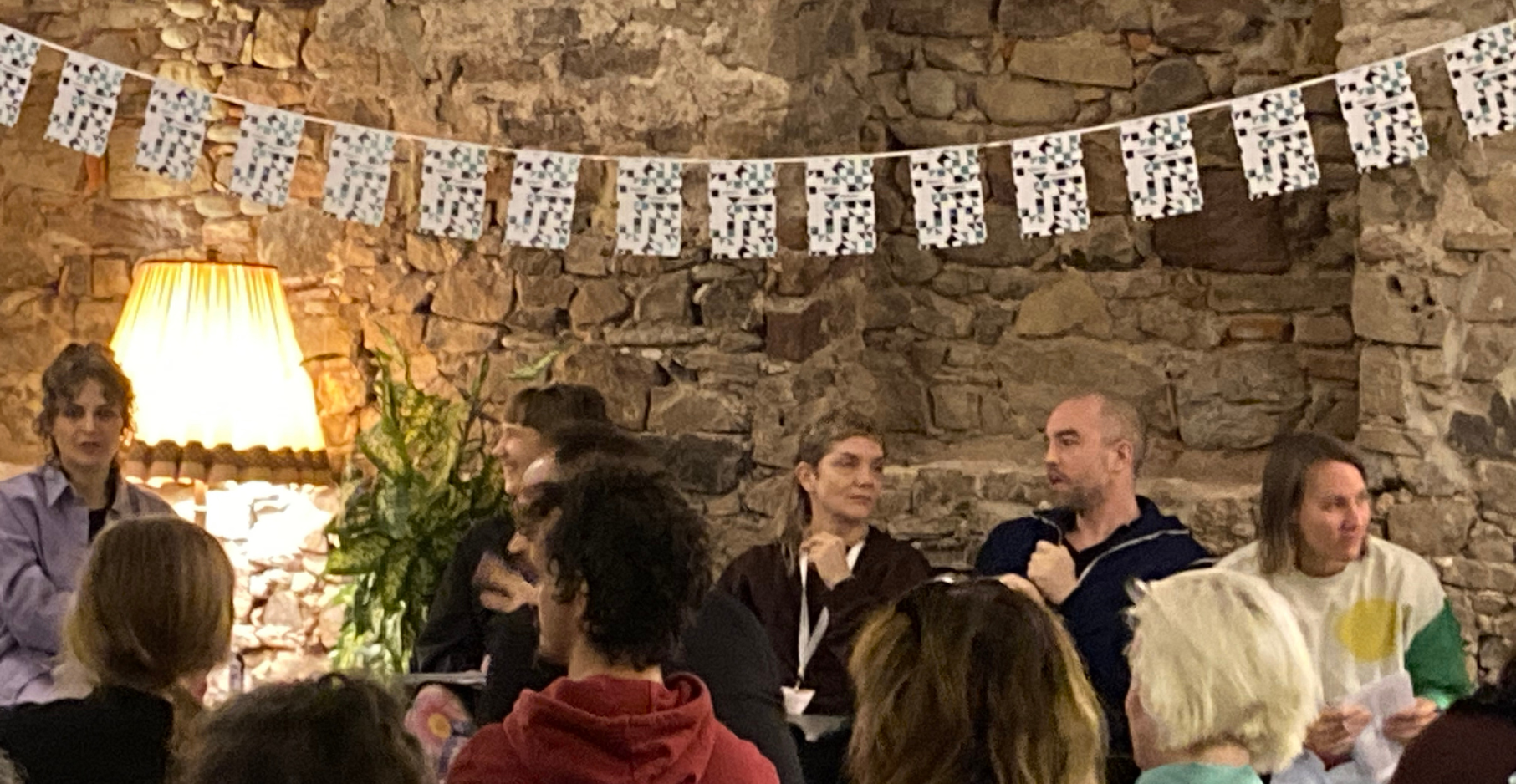Kathleen Heil (dance journalist) and Rachel Oidtmann (author / dancer) write alternately in their native languages English and German about the Tanzplattform Deutschland 2024.
Emi Miyoshi, Lisa Klingelhöfer, and Julia Klockow of Freiburg’s freelance dance scene each led morning warmups within the framework of Tanzplattform Deutschland 2024, where we had a chance to move before beginning each day’s program. It was a welcome, more intimate way to connect with each other before diving into big groups to address big questions, perhaps a way even to move through these questions in a small way, simply by being together. In Klingelhöfer’s warmup, we broke off in pairs to improvise movement impulses in exchange and then brought these back to the larger group, energized by the ideas our different bodies imagined.
At the open panel “Who cares who’s watching?”, a discussion on the issues artists, institutions, and producing partners face regarding national and international distribution and touring, the panelists explored how the challenges inherent in making work should be connected back to the desire to share work meaningfully with audiences. Anne Kersting, a dramaturg and curator of the producing partner Antje Pfundtner in Gesellschaft in Hamburg, proposed that distribution is not the right word, stressing that the practice is about dissemination and connecting with audiences. Godlive Lawani, founder and director of State Performing Arts Management in Berlin, asked if we might not reimagine the term distribution as connecting.
This was echoed by the other panelists, along with a frustration about the sustainability of producing performance projects in Europe. The director/choreographer Stephanie Thiersch, founder and director of Mouvoir in Cologne, shared some disheartening statistics from a study conducted in France: half of all pieces produced there are performed on only one or two occasions, and more than sixty percent of works created have a life span of less than a year. She noted that, if works aren’t able to be disseminated and shared, than the chance to connect and dialogue with audiences cannot happen at all.
This desire for connection is the guiding force of dance, the artists, producers, and hosting institutions all emphasized, and an artist who goes by The Pirate read from a prepared statement, stating that the structure has to recognize its own limits and stop making dance within the logic of accumulation and competition. This is the perennial question: how to find points in common, what to do about artists working on the scene who are not connected to institutions and distribution networks and therefore missing from the structure. The Pirate reminded audiences that a lack of resources is not an excuse for unfair distribution of resources. Rui Silveira, artistic and managing director of the contemporary performing arts organization Something Great in Berlin, said the work needed to be seen as a shared task, so that all involved can conceive themselves as co-producers in the process.
Katharina Senzenberger’s crowd-pleasing and sold-out Wetland has certainly succeeded in generating a rousing—and arousing—connection to its audiences, with dancers slipping, kissing, and sliding across a wet floor to hard-driving techno and pop. Rain begins to fall on the white stage about thirty minutes in, when two bodies come together for a kiss, and the light shower then falls harder, eventually becoming a rollocking swamp of flung hair and gliding, joyous bodies. Though I loved the work’s celebratory queering of Busby Berkley delights, I missed from the piece a deeper choreographic development of the possibilities of movement inherent in the uniqueness of the slippery surface.
In listening to and conversing with dance artists in these days, I have the sense there is a collective longing to forge connections that don’t simply recreate the same structures we wish to critique in an artistic context. There is a desire for greater sustainability and equity from the side of artists making work, as well as from that of producing and institutional partners. How do we navigate and transform the often overwhelming challenges of producing art? Are there ways to push our imaginations further in the quagmire?
As part of tanzschreiber@TPD24, a cooperation between Tanzbüro Berlin and the organizers of Tanzplattform Deutschland 2024 (dance department of Theater Freiburg), Rachel Oidtmann (author / dancer) and Kathleen Heil (dance journalist) accompanied the festival in writing. The Tanzplattform Deutschland 2024 took place from February 21-25, 2024 in Freiburg.




